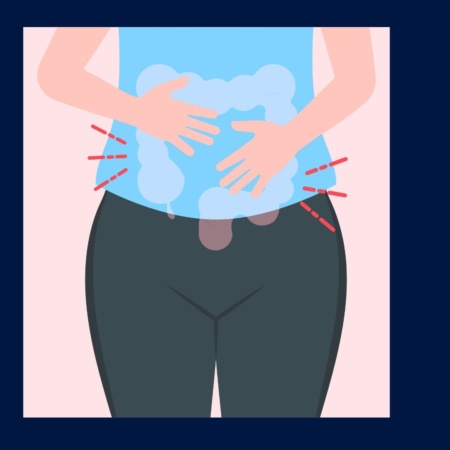What is IBS?

Irritable Bowel Syndrome (IBS) is a common but often misunderstood digestive condition that affects millions of people worldwide, including an estimated 13 million in the UK. While IBS is not life-threatening, it can significantly impact daily life, causing discomfort, distress, and disruption to work, social activities, and mental health. So, what exactly is IBS?
IBS is a functional gastrointestinal disorder, meaning that while there are no visible signs of damage in the digestive tract, it affects the way the gut functions. It is a chronic condition that varies in severity and can be triggered by factors such as diet, stress, and hormonal changes. The exact cause of IBS remains unclear, but it is thought to be linked to an interplay of gut-brain communication, changes in gut motility, increased sensitivity to pain, and alterations in gut bacteria.
IBS and IBD, what’s the difference?
IBS and Inflammatory Bowel Disease (IBD) are often confused, but they are distinct conditions. IBS is a functional disorder affecting how the gut functions without causing inflammation or damage. In contrast, IBD (which includes Crohn’s disease and ulcerative colitis) is an autoimmune disease that causes chronic inflammation and damage to the digestive tract. Unlike IBS, IBD can lead to serious complications, including ulcers, intestinal strictures, and an increased risk of colorectal cancer. While IBS is managed through lifestyle changes and symptom control, IBD often requires medications like immunosuppressants and, in some cases, surgery. Although there can be some overlap in the symptoms of IBS and IBD, IBS does not cause Crohn’s disease or ulcerative colitis.
Types of IBS
IBS is classified into different types based on the symptoms a person experiences most:
- IBS-C (IBS with constipation) – infrequent bowel movements, difficulty going to the toilet and hard, lumpy poo.
- IBS-D (IBS with diarrhoea) – frequent and an urgent need to use the toilet, and loose, watery poo.
- IBS-M (Mixed IBS) – involves alternating symptoms of both constipation and diarrhoea.
- IBS-U (Unclassified IBS) –where the symptoms do not fit neatly into one of the above categories.
Symptoms of IBS
The symptoms of IBS vary from person to person but commonly include:
- Abdominal pain or cramping, often relieved by going to the toilet.
- Bloating and excessive gas.
- Diarrhoea or constipation, sometimes alternating.
- Mucus in the poo.
- Nausea and fatigue.
- Increased urgency or difficulty in controlling bowel movements.
These symptoms can come and go in flare-ups, which can last days, weeks, or even months at a time.
Causes
While the precise cause of IBS is unknown, several factors are believed to contribute to its development:
- Changes in gut microbiota: An imbalance in gut bacteria may contribute to symptoms.
- Stress and anxiety: Mental health conditions can exacerbate IBS due to the gut-brain connection.
- Infections and antibiotics: Some people develop IBS following a gut infection (post-infectious IBS).
Diagnosis of IBS
There is no specific test for IBS, and diagnosis is typically made based on symptoms and ruling out other conditions. The GP may ask questions about how often you go to the toilet, when you get symptoms and how long they last. They may arrange for you to have blood tests, stool tests, or a colonoscopy to exclude conditions such as coeliac disease, inflammatory bowel disease (IBD), or bowel cancer.
Treatment and Management
Although there is no cure for IBS, symptoms can be managed through a combination of dietary and lifestyle changes, and medication.
Dietary Changes
Changes to your diet may help manage IBS symptoms:
- The low-FODMAP diet involves avoiding foods that ferment in the gut, which can reduce bloating and discomfort, and a dietitian can provide guidance.
- Soluble fibre, found in foods like oats and flaxseeds, may ease constipation, while insoluble fibre (such as bran) can worsen symptoms for some people.
- Probiotics, which contain beneficial bacteria, may improve gut health.
It's also important to avoid common triggers, including caffeine, alcohol, fatty foods, artificial sweeteners, and dairy. Making these dietary adjustments may help to control IBS and improve overall digestive health.
Lifestyle Changes
As well as changes to your diet changes to your lifestyle may help to manage the symptoms of IBS:
- Regular exercise: Activities such as walking, yoga, and swimming can improve digestion and reduce stress.
- Hydration: Drinking plenty of water helps prevent constipation and also dehydration if you have diarrhoea unless there is another medical reason for restricting fluids.
- Sleep hygiene: Getting sufficient rest can support gut function.
- Stress management: Techniques such as cognitive behavioural therapy (CBT) may help manage IBS symptoms.
Medication
There are a variety of medications that may be prescribed to help manage the symptoms of IBS. These vary depending on the nature of the symptoms. For example, you may be prescribed laxatives if one of your symptoms is constipation.
IBS is a complex but manageable condition that affects millions of people in the UK. While it has no cure, effective treatment options exist, including dietary changes, medication, lifestyle modifications, and psychological support. Understanding triggers and developing a personalised management plan can significantly improve quality of life. If you suspect you have IBS, consult your GP for diagnosis and support. With the right approach, many people with IBS can lead a fulfilling and comfortable life.
Share this article:
by SecuriCare Team





